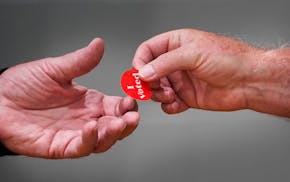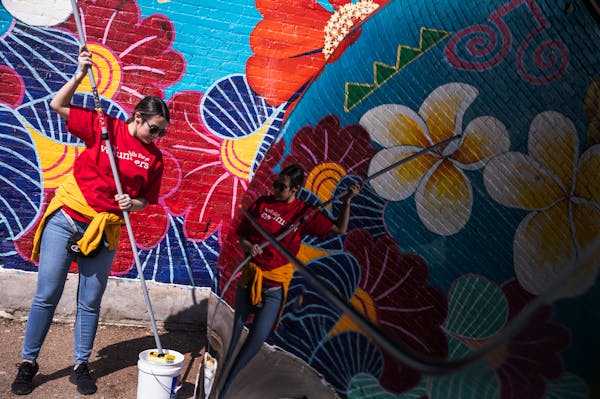Charlayne Hunter-Gault's warm voice and authoritative presence is well-known to public radio and television fans. A veteran journalist, she reported for the New Yorker magazine and the New York Times, and for two decades was a national correspondent for "The NewsHour with Jim Lehrer." For the last 12 years, she's been based in South Africa as a correspondent, first for CNN and now for National Public Radio. ¶ The Emmy-award winner not only covered America's civil rights movement -- she was part of that story. In 1961, she was the first African-American woman admitted to the University of Georgia after NAACP lawyers took her case to court. During her first night in the dormitory, white students demonstrated against her admission and threw rocks through her windows. At times, she and the other black student who integrated the campus that year needed police escorts on campus. ¶ Hunter-Gault will be the keynote speaker at Monday's 18th annual Dr. Martin Luther King Jr. breakfast at the Minneapolis Convention Center, sponsored by the General Mills Foundation and the United Negro College Fund. The event is sold out but will be broadcast live at 8 a.m. on Twin Cities Public Television. For more information, go to mlkbreakfast.com. ¶ Editorial writer Denise Johnson recently spoke with Hunter-Gault about King's legacy, race, and civil and human rights. Here are excerpts from the conversation:
QYou will address the theme "Answering the Call" to encourage community service consistent with Dr. King's legacy. What is your view of America's standing on civil and human rights and living up to King's dreams?
AWhat is wonderful about the Minneapolis event and other commemorations is that they recognize people who are committed and connected to the values of Dr. King. We achieved a lot during the civil-rights movement following his leadership. Things that enabled us to realize our dreams are things we now have to work to protect. We have children and grandchildren -- we have to ensure that those things are present in the lives of those who come behind us.
Democracy, although it's the best we've got, is not perfect. We have to continue to be vigilant. There is a Haitian proverb: Beyond the mountains, more mountains. King was trying to prepare us for that. While we might have gotten to the mountaintop on the strength of his values and activism -- beyond the mountain are more mountains. Commemorations of King say to me that there are people who are aware of this challenge.
QDuring your career, you have been the first woman, first African-American or both in several positions. Now we have a presidential campaign with the first black and first woman as frontrunners -- and one in which race has been raised in interesting ways. What's your assessment?
ARace is featured in a very contentious primary -- again that reminds us to be vigilant. But I'm not pessimistic. I'm encouraged even when the discourse is contentious. However uncomfortable that makes us, we talk about it, we debate it and that's healthy. This is some of the most-energetic debate about race I've seen in a long time -- especially since 9/11, when people were so traumatized. Americans are coming out of that dismal period to actually engage in what democracy means and take on some of the unfinished business of the civil-rights movement. Race is that unfinished business.
QAnd how should it be addressed?
ADebate, discussion, honest conversations. MLK said the movement must include blacks and whites, young and old, north and south. We need organizations that embrace all kinds of Americans who will talk openly, more groups that include people who disagree. No one can do it alone. We need people of all races, classes and backgrounds.
That's why this campaign is so exciting; it has awakened young people, poor people. Having the discussion involving two people with good [civil-rights] credentials helps. [Obama and Clinton] are not symbolic figures. They are people of substance who have earned their positions.
In America, we've had periodic eruptions around race. We talked about two separate societies after riots in 1968, then discussions occurred again after Rodney King. But there isn't an ongoing, constructive conversation. We need to figure out how to harness this energy into something lasting that benefits we the people.
QIn the 1960s, you and another black student desegregated the University of Georgia. Today, many American public schools, due to housing patterns and poverty, have become resegregated -- especially for lower-income students of color. Should we work for more desegregation or improve learning for students where they are?
AThis has been a painful thing to see. We have to do both -- upgrade schools and expose children to those who don't look like them. I do worry about the "two nations" issue. The problem with single-race schools is that they almost never get the equality they deserve. The other part is psychic. When you compete on an equal level with people who look different from you, you are empowered in a different way.
If America isn't careful, it will become a Third World country. It is in the best interest of Americans to ensure that, as Dr. King used to say, all children have equal access to success. India and China are moving to meet the needs of millions through education. There is a lesson in what they are doing -- building the middle class. Americans need to be informed about the importance of investing in their own so that the nation can remain competitive.
QYou've mentioned values several times both around King's legacy and about education.
AThat is part of what we're losing in America. Even in the segregated society I grew up in -- with hand-me-down books from the white schools that had pages torn out of them -- we succeeded because of values that our teachers, mamas, papas and neighborhoods taught us. There was a circle [of adults] who ensured that we had those values. We need to recapture that.
And I think we are sufficiently mature as African-Americans to be able to talk about our issues and not worry about who overhears and how they are going to react. We have a foot in the door of so many places of power now that when someone messes with us, something can be done. We must have concentrated attention, more creative ways of thinking about race, education and solving other problems, because our future is at stake.
QOther ways to "answer the call?"
APut the minds of those who benefitted from Dr. King's movement to work. Even as well-educated, young people make megabucks in corporations, have them detailed to these issues. It is OK for them to be making a lot of money, but it is not OK to make it in isolation. Use what you've got in spare time or make time to give back and concentrate your abilities on some of these perplexing issues.
QAre there parallels between the struggle for civil rights in America and South Africa?
A You have evolving societies. Tremendous progress has been made, and much of that progress cannot be reversed. The same is true here in South Africa. I worry about some regression, though. In the states; we certainly should have done even better by now.
Any nation must build its middle class to become a country that will attract investment and growth. In South Africa, the legacy of oppression and deprivation is so great, no government on earth could address it alone. What this government has done is concentrate on growing the economy, sometimes at the expense of reducing poverty. Only time will tell whether that approach was the right one and whether the change in government here will eradicate poverty faster.
QFor many years, you have covered Africa. Although Kenya was considered relatively stable, its current troubles follow the pattern of several other nations on the continent, namely leaders who won't let go.
AWhat's happening in Kenya is disturbing: We thought we had a relatively stable democracy there. Africa has had corrupt leaders. In the past -- and this is not to excuse corruption -- but some of this the American government promoted or at least looked the other way and made possible, when despots stood against communism. So that helped to establish the kleptocracies.
In Kenya right now, that is at the bottom of what's going on. The Kikuyus of the ruling party have been in power to the detriment of others. That whole pattern has been rampant in Africa. Now people are rising up and saying no.
I think that pattern is changing. New rules from the African Union are starting to create another set of dynamics. A growing number of leaders are leaving office democratically. A new ethos is emerging. Nongovernmental, civil-society groups are holding the feet of the powerful to the fire. The international community can help those who are trying to ensure more transparency, respect for human rights, empowerment of women, thoughtful fiscal management, etc. It is important for the world to support those things, because the world will benefit from a strong, healthy continent of empowered people.
For Mother's Day, I don't want brunch. We need a cease-fire.



